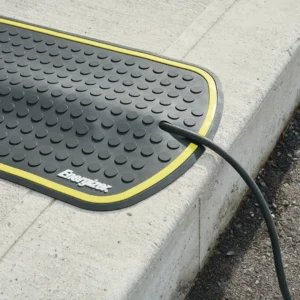This is part of a collection of case studies that focus on creative charging solutions for EV drivers in multifamily housing. For more information and the full collection, visit our Charging Solutions for EV Drivers in multifamily Housing hub.
Challenge
An increase in electric vehicle adoption in cities can come with a problem—where do those new EV drivers charge their vehicles? Infrastructure projects take time, and installing EV chargers in cities is no different. Long-term solutions can be implemented, but what do EV drivers do in the short term while they wait?

Objectives and solutions
In Cambridge, EV drivers struggling to find charging solutions were given a way to temporarily meet their charging needs. Residents can apply for a permit to get a mat that covers a cord they run across the sidewalk to charge their cars on the street.
If approved for a permit, they can also get a 9-foot-tall swing arm that extends above the sidewalk. The charging cable must be connected outside and can only use 120 volts. Furthermore, the cord can be out for 12 hours a day or less and has to be removed from the sidewalk when not in use. It is important to note that this is intended to be a stop-gap solution until long-term solutions are implemented and more public charging stations become available for Cambridge drivers.
Elements for Success
- While long-term solutions require more delicate planning and time, short-term solutions like these simply need to give drivers the tools to charge. Cambridge’s plan matches a need with a rapidly deployable solution. This specific plan comes with some restrictions, but those restrictions are worth it for the convenience of being able to charge your EV whenever you need to.
- This policy solution recognizes the urgent needs of residents without home charging and gives them an easy and convenient solution.
References
- Cambridge, Massachusetts legalizes sidewalk electric vehicle charging
- City of Cambridge Announces Electric Vehicle Charging Pilot Program
Recap:
Charger type: Level 1 charging
Charging type: Private
Problem addressed: Access, Equipment
Solution type: Policy

